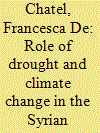| Srl | Item |
| 1 |
ID:
125110


|
|
|
|
|
| Publication |
2013.
|
| Summary/Abstract |
In recent years, a growing body of research has set out to examine the role that emotions play in shaping political attitudes and behaviors regarding terrorism. However, one major issue that is generally overlooked is whether the thematic relevance of emotive triggers leads to differential effects on people's reactions to international terrorism. Specifically, does anger-regardless of its source-tend to drive people towards supporting an aggressive foreign policy option to counter terrorism, or do the thematic underpinnings of anger (i.e., the specific contents that trigger this particular emotion, such as watching a news story about a recent terrorist attack) matter vis-à-vis the policy choice? To address this gap, this study experimentally examines the impact of anger-induced by thematically relevant versus irrelevant emotive triggers-on people's cognitive processing and foreign policy preferences regarding international terrorism. Overall, we find that the induction of anger via thematically relevant emotive triggers leads to a higher tendency for selecting a military option, a lower amount of information acquisition, and a shorter processing time in response to terror-related incidents.
|
|
|
|
|
|
|
|
|
|
|
|
|
|
|
|
| 2 |
ID:
131455


|
|
|
|
|
| Publication |
2014.
|
| Summary/Abstract |
This article examines the role of drought and climate change as triggers of the Syrian uprising that started in March 2011. It frames the 2006-10 drought that struck north-eastern Syria in the context of rapid economic liberalization and long-standing resource mismanagement, and shows that the humanitarian crisis of the late 2000s largely predated the drought period. It argues that focusing on external factors like drought and climate change in the context of the Syrian uprising is counterproductive as it diverts attention from more fundamental political and economic motives behind the protests and shifts responsibility away from the Syrian government.
|
|
|
|
|
|
|
|
|
|
|
|
|
|
|
|
| 3 |
ID:
191006


|
|
|
|
|
| Summary/Abstract |
Although past research has addressed why civilians are targeted, we know less about why non-state actors escalate violence against civilians at particular times. This article seeks to identify the events that trigger spikes in violence against civilians committed by non-state actors. We employ an innovative method to identify twenty-four such escalations in Africa committed by twenty different non-state groups between 1989 and 2015. Rigorous case studies reveal three major types of triggers, including situations in which (1) groups lose relative power, (2) groups gain relative power, and (3) opponents attack civilians. Specifically, we find that opponent military advances—which results in a relative loss of power for the non-state actor—are the most common trigger. More broadly, 75 percent of all escalations are tied to a group’s relative loss in power. These results improve understandings of civilian targeting by non-state actors and may inform efforts to forecast such violence before it occurs.
|
|
|
|
|
|
|
|
|
|
|
|
|
|
|
|
| 4 |
ID:
156742


|
|
|
|
|
| Summary/Abstract |
Following President Donald Trump’s decision no longer to certify that the Iran nuclear accord is in the
U.S. national security interest, the conversation in Washington has focused on what Congress can and ought to do next.
|
|
|
|
|
|
|
|
|
|
|
|
|
|
|
|